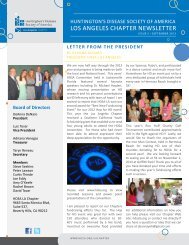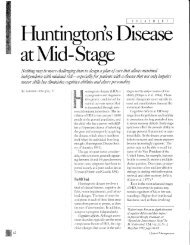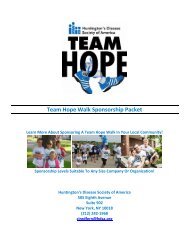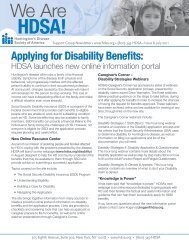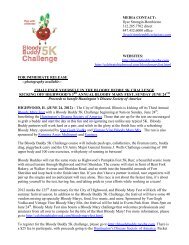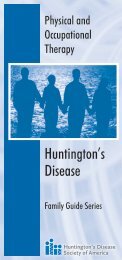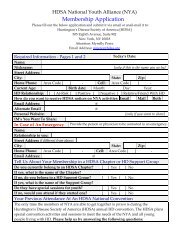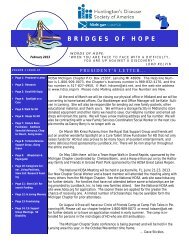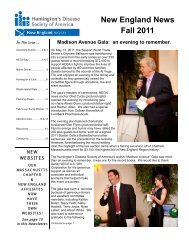Understanding Behavior in HD.final.8-18-05 - Huntington's Disease ...
Understanding Behavior in HD.final.8-18-05 - Huntington's Disease ...
Understanding Behavior in HD.final.8-18-05 - Huntington's Disease ...
You also want an ePaper? Increase the reach of your titles
YUMPU automatically turns print PDFs into web optimized ePapers that Google loves.
16<br />
PREPARE FOR CHANGES IN ROUTINE<br />
Although rout<strong>in</strong>e is preferable for many people with <strong>HD</strong>, change is unavoidable at times. For example,<br />
some family members with <strong>HD</strong> need to move from an upstairs bedroom down to the ground floor to lessen<br />
the use of stairs and dim<strong>in</strong>ish falls. Expect this change to create some stress for them and try to make the<br />
transition as gentle as possible. Preparation is important: tell them well ahead of time and tell them more than<br />
once. This will help them make the mental adjustment before they must actually physically change rooms.<br />
Focus on the familiar and try to make the changes one at a time. For example, do not move the person and<br />
purchase new bedroom furniture at the same time. When mov<strong>in</strong>g to a nurs<strong>in</strong>g home make sure to br<strong>in</strong>g<br />
photos, personal items and other objects that are familiar to the person. Of course, when at all possible, the<br />
person with <strong>HD</strong> should be <strong>in</strong>volved <strong>in</strong> the entire process of select<strong>in</strong>g where he or she will live.<br />
Mov<strong>in</strong>g to a Care Facility: Helen’s Story<br />
One family was confronted with resistance from their family member, Helen, when it<br />
came time to discuss the topic of placement <strong>in</strong> a skilled nurs<strong>in</strong>g facility. Helen’s family<br />
was not confrontational with her. They simply shifted the discussions over a several-month<br />
period from “if you need to be placed” to “when you need to be placed”<br />
to “it’s gett<strong>in</strong>g to be the time you will need to move <strong>in</strong>to a facility” to “Where you are<br />
go<strong>in</strong>g to live is an important decision and I do not want to make it without you. I<br />
have found four places I want you to see.” Placement was discussed at various<br />
times from the beg<strong>in</strong>n<strong>in</strong>g of the disease, so the topic was not a surprise. Although<br />
there was some argument when the time came, Helen was given time to process<br />
the change as well as the power to choose the facility.<br />
CARE FOR CAREGIVERS<br />
The primary responsibilities of caregivers are twofold:<br />
1) To advocate for the needs of and to provide care for the person affected with <strong>HD</strong>.<br />
2) To advocate for the needs of and to provide care for oneself.<br />
These two aspects of caregiv<strong>in</strong>g are equally important and essential.<br />
Caregivers are <strong>in</strong>dividuals who assist with the care of a person or persons with <strong>HD</strong>. Caregivers can be<br />
family members, friends, professional staff or volunteers. Car<strong>in</strong>g for someone with <strong>HD</strong> is physically and<br />
emotionally challeng<strong>in</strong>g. Pay<strong>in</strong>g attention to one’s own needs and limitations is important for the health and<br />
happ<strong>in</strong>ess of both the caregiver and the <strong>HD</strong>-affected <strong>in</strong>dividual. When caregivers become ill, overloaded or<br />
depressed, they are unable to safely and effectively provide for the needs of the <strong>HD</strong>-affected <strong>in</strong>dividual. For<br />
many of us, it is difficult to consider car<strong>in</strong>g for oneself as a way of car<strong>in</strong>g for someone else, but this is<br />
probably the most important aspect of caregiv<strong>in</strong>g.




